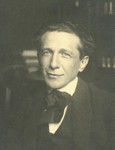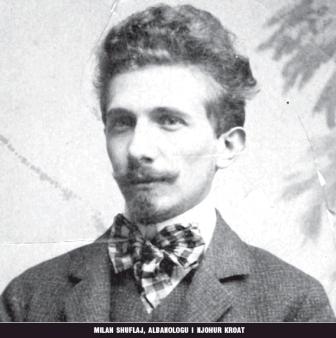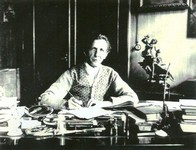| 75 years since an appeal of Albert Einstein and Heinrich Mann to the League of Nations against the murder of Croatian scholar Dr Milan Sufflay in Croatian captial Zagreb in 1931 at the age of 52 |  |
Albert Einstein
Heinrich Mann
APPEAL TO THE INTERNATIONAL
LEAGUE OF HUMAN RIGHTS
125, AVENUE DE WAGRAM, PARIS Distinguished friends!
We cannot let pass the occasion to alert the International League of Human Rights to the events that led to the murder of a Croatian scholar Dr Milan Sufflay on February 18 [1931].
As the scholar was going home on that day, he was, on a street in Zagreb, attacked from behind and, according to the reports we have received, murdered with an iron rod. The next day he succumbed to the heavy injuries and died. He was buried at Zagreb's Mirogoj Cemetery on February 22, next to the other Croatian martyrs.
 Professor Milan Sufflay was renowned for his numerous research articles and activities. Zagreb's newspapers, however, were not allowed to report on the activities of this scholar. The obituary notice was confiscated and condolence telegrams were not allowed to be sent. It was not allowed to announce the time of the funeral, and the hanging of a flag of mourning on the university building was forbidden.
Professor Milan Sufflay was renowned for his numerous research articles and activities. Zagreb's newspapers, however, were not allowed to report on the activities of this scholar. The obituary notice was confiscated and condolence telegrams were not allowed to be sent. It was not allowed to announce the time of the funeral, and the hanging of a flag of mourning on the university building was forbidden.
The students that attended the funeral were banished from Zagreb by police authorities and the Croatian national tricolours that decorated the wreaths were removed.
The name of the murderer, Branko Zwerger, was known. The organisation that he was a member of was also known ("Young Yugoslavia"). It was known that the murder was arranged on the night between February 11 and 12, in the flat belonging to the commander of the city, General Belimarkovic. Brkic, Godler, Marcec and the murderer Zwerger were the members of the "Young Yugoslavia" organisation that took part in the assassination. Despite that, the Zagreb police announced on February 19 that the murderer was unknown.
The following facts preceded the murder of professor Sufflay:
- On the occasion of the visit of the King of Serbia to Zagreb in January, a number of the most renowned personalities - Croatian leader Dr Vlatko Macek, Dr Ante Trumbic, Dr Mile Budak, university professors Dr Filip Lukas, Dr David Karlovic, Dr Milan Sufflay and others - were sent threatening letters signed "For the King and the Homeland," according to which their lives and the lives of their families would be the price if there were any protests or demonstrations during the King's visit to Zagreb.
- King Alexander held a public speech to the terrorist organisation bearing the name "Young Yugoslavia," in which he spoke about removing Croatian representatives elected by the people, which he had carried out. He said: I have removed the representatives. He himself gave the initiative, that is the order, for his formal removal from the parliament, to be transformed into a physical, that is lasting, removal. June 20, 1928, when the Croatian leaders were murdered in the Belgrade parliament, should be used as a guideline.
- Following that the government's press appealed to the public to murder the leaders of the Croatian people. Thus it was written in the government newspaper "Nasa sloga" (Our Unity) in Su¹ak on February 18: "The heads will be smashed."
- On the same night, Professor Sufflay was murdered in Zagreb. The second example of an open invitation to murder was published on February 28 in the Split journal "Zastava" (The Flag), while further invitations were published in the Maribor journal "Jugoslaven" (The Yugoslav). Some members of "Young Yugoslavia", who had the task of carrying out the murders of Croats in foreign countries, were on March 12 in Vienna caught while carrying out preparations for the murders, and were handed to the courts in Vienna for judicial proceedings.
A delegation of Croatian national representatives handed the League of Nations in Geneva a Memorandum, dated January 25, 1930, which was also sent to governments and organisations of all cultural states, warning them about the situation in Croatia. The Memorandum was an accusation before the entire world against the absolutist rule of the King of Serbia and against the terror and horror of the rule against the Croatian people. As facts have proven, the horrors since that time have only be come worse. With consideration to this alarming state of affairs, we ask of you, the International League of Human Rights, to take all the necessary measures to put a stop to this endless and violent tyranny.
Murder as a source for achieving political goals must not be tolerated.
Glorifying murderers as national heroes must not be tolerated.
We feel that it is the duty of the International League of Human Rights to appeal to all those that respect freedom and the human rights of nations, to oppose the tyranny that rules in Croatia and to start the most dignified protest. All countries, especially France, Germany, Poland, Austria, places where the International League of Human Rights exists, have the responsibility of acting as a shield for this small, peaceful, and enlightened nation.
We await your decision and send you kind regards.
German League of Human Rights
Albert Einstein
Heinrich Mann
April 1931, Berlin.
Source:
Darko Sagrak: Dr. Milan ©ufflay, hrvatski aristokrat duha, Hrvatska uzdanica, Zagreb, Hrvatska, 1998. ISBN 953-96514-0-9 ("Darko Sagrak")
The first three photos are from the private collection of Mr. Darko Sagrak, and under copyright, published in the book by Darko Sagrak, Musa Ahmeti (editors): Dr. Milan pl. Sufflay, I, II, Izabrani eseji i clanci, Nakladnik Darko Sagrak, Zagreb 1999. I express my gratitude to Mr. Darko Sagrak for permission to use the photos. Mr. Sagrak is president of the society in Zagreb, Croatia, bearing the name "Dr. Milan pl. Sufflay".
Related links:
- Einstein's and Mann's appeal, in Croatian
- New York Times: Einstein Accuses Yugoslavian Rulers in Savant's Murder
- New York Times: Raditch left tale of Yugoslav plot, article published in August 23, 1931 [pdf]
- A Letter of Protest sent by American intellectuals organized by Roger N. Baldwin, Chairman of the International Committee for Political Prisoners, to the Yugoslav representative in Washington on November 24, 1933.
- Milan Sufflay
- Josip Pecaric: Serbian Myth about Jasenovac, Naklada Stih, Zagreb 2001. ISBN 953-6959-00-3 (494 pages), summary
- NĖ DUBROVNIK, TĖ DHĖNA TĖ REJA PĖR MILAN SHUFLAJ, in Albanian
- [Milan Sufflay: Dalmatinsko - hrvatska srednjovjekovna listina & povijest hrvatskoga notarijata od XI. do XV. stoljeca]
Milan Sufflay (1879-1931), was a brilliant Croatian historian and polyglot of international reputation, known by his numerous scientific contributions, especially in the field of albanology. His mother was a German from Hungary, and his father a Croat. In 1913 and in 1918, in cooperation with Konstantin Jirecek and Ludwig von Thalloczy, he published two volumes of Acta Albaniae (Acta et Diplomata res Albania mediaevalis illustrantia) in Vienna, in the Latin language. It covers the history of Albania from 344 AD to 1406. His monograph Srbi i albanci (Serbs and Albanians), 1925, has been translated into French and English (English translation from Croatian original by Theresa Alt and Wayles Browne, Cornell University, USA). From 1908 (at the age of 29!) till 1918 Sufflay was professor of the University of Zagreb. From 1918 onward he was not allowed to lecture any more, and the ex-Yugoslav government in Belgrade did not allow him to visit Hungary, Italy, and the Vatican for scientific archival work. It was forbidden for him to accept the position of professor offered to him by the University of Budapest in Hungary. Despite all this, Sufflay planned to publish a continuation of Acta Albaniae in four additional volumes. The project had been financed by the Albanian King Zogu and the government of the state, and Sufflay even delivered a lecture about his project in the building of the Albanian Parliament in Tirana in Albanian language. The financial support equivalent to today's 3,000,000 USD had been deposited for him in a Swiss bank.

Sufflay was assassinated by a steel rod on a street in the center of Zagreb in 1931, at the age of 52. After the dramatic events that followed, Albert Einstein and Heinrich Mann sent an appeal to the International League of Human Rights in Paris to protect Croats from the terror and persecutions of the Serbian police. It was also published in the New York Times (6th May 1931). As we learn from this letter, the newspapers in Zagreb were not allowed to report about Sufflay's activity; it was not allowed to attach a half-mast flag on the main building of the University of Zagreb in his honour; the time of the funeral could not be announced publicly, and even condolence messages were not allowed to be telegraphed. In their letter Einstein and Mann hold the Yugoslav king Aleksandar explicitly responsible for the state terror over the Croats. The letter concludes that it should not be tolerated that killings be allowed as a means to achieve political goals. We should not allow killers to be promoted as national heroes. He is the author of the first Croatian SF (science fiction) novel Na Pacifiku 2255. In 2002, an international congress "Shuflaj dhe Shqiptarėt", dedicated to Milan Sufflay, the pioneer of albanology, has been organized in Tirana, capital of Albania. Alfred Moisiu, president of Albania, posthumously decorated Milan Sufflay with the order of "Naim Frasheri d'or". Sufflay's written opus is enormous, comprising about 3000 items.
New York Times
May 6, 1931
Einstein Accuses
Yugoslavian Rulers
in Savant's Murder
 Charges the Slaying of Sufflay, Noted Croatian Leader, Was Inspired by Government.
Charges the Slaying of Sufflay, Noted Croatian Leader, Was Inspired by Government.
Increase In Cruelty Seen.
League for Rights of Man is Urged to Take Action
Against "Horrible Brutality" of Belgrade Regime.
Special cable to The New York Times.
Berlin, May 5. Accusing the Yugoslav Government of the murder of a Croatian Professor Milan Sufflay, who was struck down in the streets of Agram [Zagreb] on Feb 18, Professor Albert Einstein and the novelist Heinrich Mann, brother of Thomas Mann, have sent a joint letter to the international headquarters of the League for the Rights of Man in Paris urging a protest against the "horrible brutality which is being practiced upon the Croatian people." The letter also was signed by the German headquarters of the league. The Paris headquarters, upon receipt of the communication, immediately undertook steps toward an effective protest in Belgrade.
"As the professor was walking home on the fatal day he was attacked from behind with an iron rod, according to our information and felled." the letter of protest reads "On the next day he died and he was buried on the twenty-second beside other Croatians."
Noted for Scientific Works.
Professor Sufflay was noted for a long list of scientific books, the letter continues.
"Yet Agram [-> Zagreb] newspapers were not allowed to report his activities and the news of his death was suppressed." the protest reads on. Condolence telegrams were not delivered. The time of the funeral was not allowed to be made public and the raising of a mourning flag on the university was forbidden. The authorities went so far as to expel those school children who took part in the funeral and to remove wreaths which were bound with the Croatian national colors fom the grave.
"The name of the murderer was known. It was Nikola Jukitsch [-> in fact, Branko Zwerger, see below]. His organization (Young Yugoslavia) likewise is known. It was even known that arrangements for the murder had been worked out on the night of the eleventh in the home of the military commandant of the city, General Beli Markowitsch, at a session in which members of the Young Yugoslavia organization, Brkitsch, Godler, Marischetz and the murderer Jukitsch [-> in fact the real name is Branko Zwerger] took part. Yet the Agram [-> Zagreb] police officially stated the next day that the name of the murderer was not known.
Charges Threats to the Croats.
Turning to the events leading to the murder, Professor Einstein and the other signers charged that when the King visited the Croatian capital in January, numerous leading Croats received letters signed "For King and Country." in which their lives and those of their families were threatened if they uttered any protest while the King was there. Professor Sufflay received one of the letters, it is charged.
"The name of this terrorist organization was Young Yugoslavia," the protest continued. "The King, in an address to the organization, told how the Croatian representatives to parliament had been put out of the way at his request. An example of this was the shooting of a Croatian leader [-> Stjepan Radic] on the floor of the house on June 20, 1928."
Following the King's visit, the murder of political and intellectual leaders of the Croatians was openly demanded in the government press, says the letter.
"The official organ Nascha Sloga in Suschak, on Feb. 18 wrote, `Skulls will be split.' The same evening Professor Sufflay was struck down," the letter says.
In January the delegates to the Croatian National Assembly sent a memorandum to Geneva calling attention to the situation in Croatia.
"The facts show that the cruelty and brutality practiced upon the Croatians only increase," Professor Einstein's letter says. "In view of this frightful situation, we urge the International League for the Rights of Man to do everything possible to press this unrestrained rule of might which prevails in Croatia."
"Murder as a political weapon must not be tolerated and political murderers must not be made national heroes. The League should muster all possible aid to protect this small, peaceful and highly civilized people."
Sufflay a Histoy Professor.
Professor Milan Sufflay, who was murdered in Agram [Zagreb] on Feb. 18, had been professor of History at Zagreb University for ten years. He had written many books on the history of Albania. In 1920 because of his connection with Croat extremists, he was sentenced to two and a half years' imprisonment for lese-majeste and high treason. On his release he resumed his political activities.
Protests against the Yugoslav dictatorship of King Alexander have been frequent since the murder of Professor Sufflay and the many "suicides" of Croats and Macedonians in the prisons of Belgrade and Zagreb.
Three Serbs were arrested in Vienna recently who were alleged to have been sent there on a murder mission with the knowledge of the Zagreb Chief of Police.
The bitter feeling in Yugoslavia has resulted in numerous bombings and assassinations.
When King Alexander proclaimed the dicatorship two years ago his chief problem was the deadlock caused by the refusal of Croatia to be dominated by a parliamentary government recruited largely from extreme Serbian sources.
A similar article appeared in the San Francisco Examiner on Sunday May 31, 1931 saying pretty much the same thing. Many thanks to Nenad Bach's CROWN, in particular to Marko.
Remark: From archival material held in Zagreb we know that the name of assassin was not Nikola Jukich (Jukitsch), but BRANKO ZWERGER (hanged in 1943 in Jasenovac). It seems that Einstein and Mann have changed the name to Jukitsch since they lived in Germany, in Berlin, from where they wrote their appeal to Paris. The name of Zwerger sounds German or Jewish, which they may have found unpleasant (and unimportant) for the purpose of this appeal. We are not in possession of the original text, which is written most probably in German. It seems that the original text is in Moscow archives. Namely, during the WW2 the Russians came in possession of all archives of the Ligue de Droits de l'Homme (League of Human Rights in Paris), concerning documents dating before 1945.
Formated for CROWN by prof.dr. Darko Zubrinic
Distributed by www.Croatia.org . This message is intended for Croatian Associations/Institutions and their Friends in Croatia and in the World. The opinions/articles expressed on this list do not reflect personal opinions of the moderator. If the reader of this message is not the intended recipient, please delete or destroy all copies of this communication and please, let us know!

